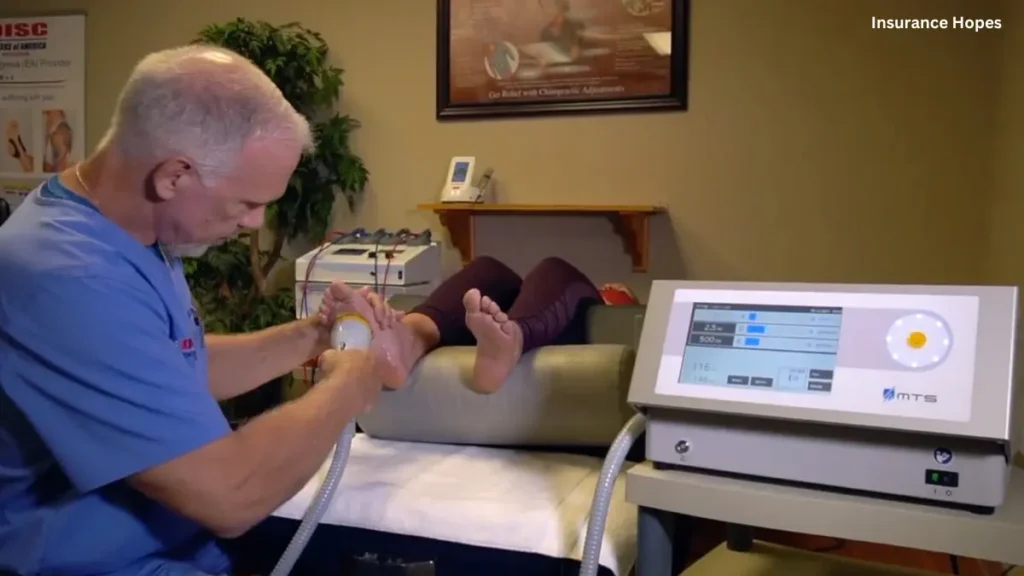Is Softwave Therapy Covered With Insurance

Soft Wave Therapy is a new and promising non-invasive treatment for pain management and tissue regeneration. However, one important concern that comes up when navigating the maze of healthcare coverage is: Is Soft Wave Therapy covered by insurance?
Getting to Know Soft Wave Therapy
Low-frequency sound waves are used in Soft Wave Therapy to cause a range of biological reactions intended to:
Reduction of pain: By controlling pain signals and encouraging the body’s endogenous painkillers to be released.
Better circulation: Increasing blood flow to the treated area and making it easier to deliver nutrients and oxygen.
Inducing the formation of new, healthy tissue is known as tissue regeneration.
Present Situation with Insurance Coverage

Soft Wave Therapy is not generally covered by insurance as of February 2024, including most private insurance plans, Medicare, and Medicaid. There are multiple reasons for this limited coverage:
Limited Clinical Evidence: Although current research shows promise, larger-scale clinical trials are necessary to confirm Soft Wave Therapy’s long-term effectiveness for specific illnesses in order to satisfy insurance companies’ strict criteria for payment.
Relatively New technique: When compared to well-established therapies that are frequently covered by insurance, soft wave therapy is a relatively new technique. Until the long-term advantages and cost-effectiveness of new treatments are more clearly proven, insurance companies usually hesitate to cover them.
High Treatment Cost: Soft Wave Therapy can be very expensive, which makes it difficult for insurance companies to justify paying for, especially in cases where there isn’t enough solid data to support a certain diagnosis.
Other Options & Suggestions
Even though Soft Wave Therapy isn’t widely covered by insurance at the moment, it might be worth looking into these other options:
Consult your insurance company: To find out more about your insurance company’s policies on Soft Wave Therapy, get in touch with them directly. Certain plans might provide restricted coverage in certain situations.
Examine Flexible Spending Accounts (FSAs) and Health Savings Accounts (HSAs): You may be able to utilize your FSA or HSA tax-advantaged account to defray some of the cost of Soft Wave Therapy.
Think about substitute medical interventions: With your healthcare provider, go over alternate therapy choices that might give a comparable degree of pain relief or tissue regeneration. You should also look into possibilities that are supported by your insurance.
Maintaining Knowledge and Examining Choices:

Insurance coverage may change over time, especially for more recent technologies like SoftWave Therapy. Here’s how to continue learning:
Speak with your healthcare provider: Depending on your particular illness and insurance plan, they may provide you the most up-to-date information on available treatment options and possible insurance coverage for SoftWave Therapy.
Keep track of updates from the creators of SoftWave Therapy: SoftWave Therapy’s creators may send out patient newsletters or updates on their website about changes to insurance coverage.
Keep up with changes in healthcare policy: Keeping up with current debates and prospective modifications to healthcare regulations may disclose future changes to insurance reimbursement for SoftWave Therapy.
Crucial Points to Remember
Be sure to speak with your doctor before beginning any kind of treatment, including SoftWave therapy. They are able to evaluate your particular needs, decide whether this therapy is appropriate for your situation, and walk you through the available options for treatment and associated costs.
Openness is essential. Before committing to any treatment plan, make sure you are aware of the expenses related to SoftWave therapy.
Remain educated. The insurance environment may change in the future as more clinical experience and research are conducted with SoftWave therapy. You can stay informed about any potential changes in coverage by staying in touch with your healthcare provider or insurance company.
CONCLUSION
Even though SoftWave Therapy might not be extensively covered by insurance in 2024, it is still a viable choice for tissue regeneration and pain relief. You may make the most of your treatment options by investigating potential alternate routes to insurance coverage, keeping up with updates, and speaking with your healthcare practitioner. Remember that in order to have the best outcomes, you must make well-informed decisions while keeping your healthcare provider in mind.











